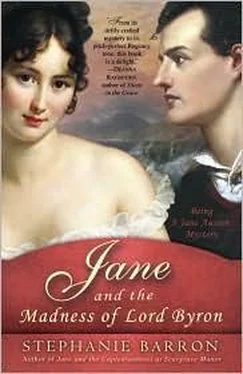“Very well,” I said. “On the strength of seven hundred guineas, I have no compunction in demanding that you sing for your supper— and frank me in a new gown I shall order tomorrow at a modiste’s I fancy in North Street. I regard myself as entirely responsible for Caro’s queer freaks, merely from having overlistened her speeches to Lady Oxford. Without myself as audience, she should hardly have performed to such a height—or been moved to plunge into the field, from a fevered desire for further applause.”
“Done,” my brother said. “What would you have me sing?”
“Your opinion of Scrope Davies. And I do not mean of his cravat, ” I added. “The Twinings’ butler would have it that Davies was acquainted with the family—that it was he, in fact, who made his friend Byron known to Miss Twining.”
“Did he, tho’?” Henry returned, with an air of surprize. “That is devilish odd , Jane. I’d have sworn he carried a tendre for the young lady himself.”
I studied my brother. The elation natural to a gentleman who has raped Fortune of so grand a sum as seven hundred guineas had been heightened by the liberal resort to an excellent French claret, which had been followed with applications of a mellow Port; and it was obvious that my brother was rather well to live , as the saying goes. I had not seen him so jubilant since Eliza’s illness first clenched its talons all too palpably in her breast, some ten months ago. I love Henry so well—he is, not even excepting Frank, the dearest of my brothers, as being the most aligned in temperament to myself—that I revelled in this resurgence of his native jubilance; and indeed, found that my own megrims were entirely banished, at the sight of Henry’s high colour and dancing looks.
“Go on,” I said.
Henry threw down his napkin and rocked backwards on his chair, the picture of happy surfeit.
“It was obvious you required an interval to examine his drunken lordship,” he began, “so I made it my business to entertain Mr. Davies. I commenced with the usual gambit—felicitations all round on the happy outcome of the inquest, and the undoubted part Mr. Davies’s own evidence had played—but I found him unreceptive. Throughout the quarter-hour in which we spoke—or I spoke , rather, for the exertion was almost entirely on my side—the gentleman was decidedly ill-at-ease.”
My interest sharpened. “From what cause?”
“Divided attention. He was engrossed in overlistening your conversation with Lord Byron, and at first I assumed he did so from an anxiety to protect his inebriated friend. However, I swiftly concluded he was consumed with a desire to know the gentleman’s sentiments, not your own, and was more nearly attending to Byron’s words than mine. Indeed, I was forced to enquire thrice whether he meant to visit the racing-ground this afternoon, before receiving less than a distracted answer.”
“He groaned, I recollect, and clutched his face with his hands, at something Byron said.”
“Quite right,” Henry replied. “But I have no notion of the subject; my ears are less acute, it would seem, than Davies’s.”
“The poet was describing his intention, once happily in possession of Miss Twining’s notice in that closed carriage he employed for abduction,” I said drily. “He was attempting to frame the spur to his passion, as I recall. Her face, her figure, her soft voice were incitement to anything you might imagine—and I should never be proof against their charms!— Or that was the burden of his periods; he’s much given to windy declarations, fairly besotted with his own words. He might as well have said: I wanted to tear her clothes from her body and have her right there against the squabs , and be done with it. I wonder why he did not?—Have her, I mean, not talk about it?”
If the image of Byron in the throes of passion caused my skin to tingle, I did not share the fact with Henry.
“I should imagine Mr. Davies is asking himself the same thing. As well as why he wastes his friendship on such a blackguard as Byron—the fellow’s tendencies are vile.” Henry leaned across the table conspiratorially. “I suspect that the idea of Miss Twining’s embarrassment has weighed heavily on Davies’s mind ever since the attempt at abduction was made. Perceiving his distress, I made so bold as to offer my condolences on the sad loss of his young neighbour. Davies stared at me in starkest misery. ‘Neighbour?’ quoth he. ‘You may call her such, if you wish; for it is true I took this house for the Season merely to observe her beauty. To meet with Miss Twining in the street by chance was unlooked-for happiness; to hear her voice, a benediction. To know that such a perfect flower is cut down, in the midst of her blooming …’ and then he was overcome, and could not go on.”
“You fascinate me, Henry.”
My brother’s countenance turned sombre. “Consider of it, Jane. How the man must be tortured . If indeed Davies loved Catherine Twining—took a house in Church Street on purpose to meet with her at every opportunity—”
“Only to have Byron descend upon him within days of Catherine’s return from her Bath seminary, and demand an introduction—”
“—and watch, powerless, as the greatest rake in England pursued his perfect flower— ”
“—and presumed so much upon friendship, as to make Davies his accomplice in Catherine’s ruin—”
“—used Davies’s lodgings as a base for his amorous interludes, and made him privy to his lewdest schemes, not excepting the foiled attempt at abduction—”
“And capped all, by naming his friend as chief witness to his movements and character, on the night Davies’s love was murdered!”
I sat back, all animation fled. “What a dreadfully sordid little tale it is, Henry.”
“Yes,” my brother agreed, “and all the more pitiable, from Davies’s apparent devotion to the girl. The fellow is suffering all the torments of grief, Jane—I’d swear to the fact, from having known that abyss myself.”
There was a little pause; I had not expected Henry to invoke his loss—indeed, I had been watching him determinedly outrun it these several days past. At length, my brother resumed, with suppressed violence: “Whether he believes his friend to be innocent or no, I wonder Davies can bear to admit Byron into his drawing-room—or tolerate a word the fellow says!”
Unlike Henry, I could comprehend how impossible it might be to thwart Byron’s will. But I was revolving the curious code of friendship and honour that obtained among gentlemen who had known one another since their schooldays. Scrope Davies had served as witness to Byron’s movements—but so, too, had Byron served as Davies’s . We had no independent witness to attest that Davies cooled his heels in the publick room at the Arms, while the valet packed Byron’s traps and his lordship settled accounts with the publican. What if Davies, that Tulip of Fashion, had required a restorative breath of air after the heat of the Assembly Rooms—and taken a turn upon the shingle?—And there met the adored object of all his phantasies, Byron’s Leila, Catherine Twining?
I had an idea of a drowned sylph, with the marks of violence about her neck—whose only crime was to have been too well loved . At what point did passion for a woman prove weaker than a murderous jealousy, of the kind Othello had known?
Chapter 21 Mrs. Silchester’s Confidence
THURSDAY, 13 MAY 1813
BRIGHTON
THE RAIN THIS MORNING WAS TORRENTIAL, FORESTALLING all ventures out-of-doors; there would be no drives along the sea, no visits to picturesque ruins, no picnics on the Downs—and to my secret relief, no assaults upon bathing machines . Henry should spend the better part of the morning at Raggett’s Club, talking airily of his keen sense of the turf; I might do as I chose—whether my whims tended towards the patronage of a favoured linen-draper’s on North Street, or several hours’ indulgence of reading in my rooms. I debated the former: Of what use was the purchase of a gown that must be black? And should I be justified in securing a different colour at Henry’s expence, against a future freed of mourning? What, I asked myself, would Eliza do?
Читать дальше












